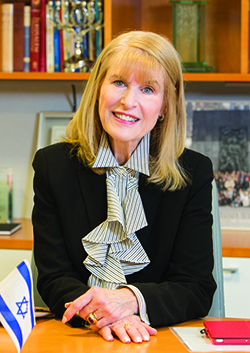Hadassah
President's Column
Reflect, Repair, Renew
 The High Holiday season is a time of reflection and renewal, an opportunity to measure ourselves against our highest standards. We often ask what errors we may have committed in the previous year, but self-reflection should also involve recognizing our strengths, redoubling our best efforts and identifying what more we can do—not only for ourselves and our families but also in the cause of tikkun olam.
The High Holiday season is a time of reflection and renewal, an opportunity to measure ourselves against our highest standards. We often ask what errors we may have committed in the previous year, but self-reflection should also involve recognizing our strengths, redoubling our best efforts and identifying what more we can do—not only for ourselves and our families but also in the cause of tikkun olam.
Like individuals, Hadassah and its institutions constantly engage in internal analysis, identifying areas where we may be falling short. But looking back over the past year, I am also struck by several stories from our Hadassah Medical Organization that stand in contrast to the political realities of the Middle East, stories that remind me how deeply rooted our dedication to tikkun olam really is.
Our signature brand of practical Zionism began as an effort to build medical and educational institutions for a future Jewish state. That meant having a presence in the Land of Israel and serving its diverse population. The health care and clinical research we put in place had to be available and beneficial to all.
That legacy continues today. Hadassah’s ethical profile is well known and it should surprise no one that our medical centers in Jerusalem treat Jewish, Muslim and Christian patients equally—that our corridors and waiting areas, operating theaters and treatment rooms are microcosms of what peace in the region should look like. But it is still enlightening to see the details.
One story that made headlines this past year involved Dr. Hadar Merhav, director of HMO’s transplantation unit, and Dr. Abed Khalaileh, director of kidney transplantation, who worked together (as they often do) in transferring a kidney from an Israeli Jewish female donor to an Israeli Arab male recipient.
Given our large numbers of patients from the West Bank and Gaza, one of the main concerns of Julie Benbenishty, nurse coordinator of HMO’s trauma unit, was the difficulty following up on her patients’ progress once they returned to hometowns where she had no professional contacts. There was no one she could recommend for rehabilitation therapy or with whom she could share medical information. She consulted with Na’ila Hayet, an Israeli Arab nurse in charge of Hadassah’s intensive care units, and the two of them created Nurses in the Middle East. The nongovernmental organization not only connects nurses across boundaries, it also holds conferences in Jordan with participants from Israel, the Arab world and Iran.
Elsewhere, HMO cardiologists are working with the Baruch Padeh Medical Center in Tiberias and the Israel Defense Forces’ Operation Good Neighbor to treat Syrian children with serious heart defects. In June, Dr. Julius Golender, head of surgical evaluation at Hadassah Hospital in Ein Kerem, examined a first group of 17 children, 14 of whom he recommended for surgery. “Hadassah is making use of our pediatric cardiac surgery department,” said Dr. Golender. “Children are coming to Jerusalem for the complex surgery and are receiving follow-up care in Tiberias.”
Hadassah has also been a key player since the 1960s in Israel’s outreach to Africa. In one of the most recent chapters of this long-running humanitarian effort, eight HMO physicians, two nurses and a physical therapist went to northern Ethiopia in March to perform spine surgeries on young people with potentially fatal spinal deformities. Led by Dr. Josh Schroeder, a spine surgeon, and Dr. Allon Moses, chairman of HMO’s Department of Clinical Microbiology and Infectious Disease, they spent a week at a hospital that serves a region of eight million people yet has no spine specialist.
Reflecting on our personal behavior is an important part of Jewish tradition, but we are also judged on the larger causes we support. Even as we search our souls this holiday season, let us also count the ways that we in Hadassah contribute to saving lives and promoting peace.
A happy and healthy New Year to all!










 Facebook
Facebook Instagram
Instagram Twitter
Twitter
Leave a Reply